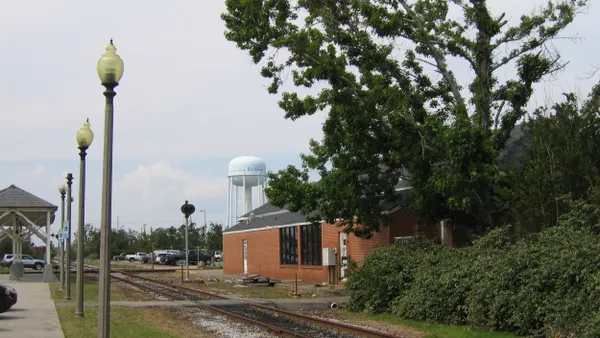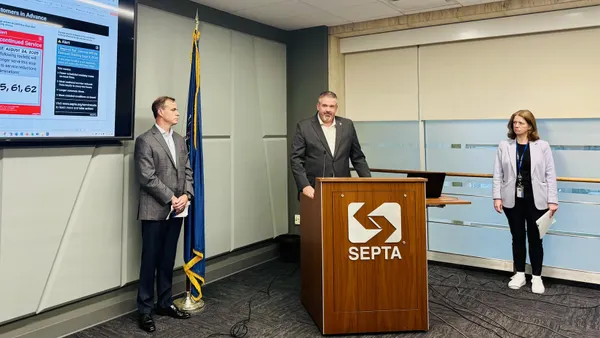Dive Brief:
- The Los Angeles Cleantech Incubator (LACI) will study zero-emission delivery and electric vehicle (EV) use by commercial fleets with the support of a $3.8 million grant from the U.S. Department of Energy (DOE), part of a broader federal grant program to decarbonize transportation.
- The DOE’s $60 million grant program will fund 24 projects targeting the electrification of passenger cars and light- and heavy-duty trucks, part of the Biden administration’s goal to move the country toward electric vehicles. The projects include research into new battery technology, vehicle materials, traffic management and mobility tools.
- The LACI grant will support work exploring commercial electric trucks in three cities — Los Angeles, Pittsburgh, and Santa Monica, California — including an expansion of an ongoing pilot in Santa Monica. In Pittsburgh, the funding will support a curbside parking pilot on smart loading zones in high-traffic areas and examine the role electrification could play in those areas.
Dive Insight:
This month, President Joe Biden signed an executive order with a goal of having half of all new vehicles sold in the U.S. in 2030 be electric, addressing the sector of the American economy that generates the largest share of greenhouse gas emissions. Getting there, however, will require a broad suite of efforts to make vehicles more affordable and usable across many sectors, not just light passenger cars.
“Fossil-fuel powered cars and trucks are a leading cause of air pollution and carbon emissions, and that is why we are focusing on decarbonizing the transportation sector to achieve President Biden’s climate goals,” U.S. Energy Secretary Jennifer Granholm said in a statement.
The grants from DOE’s Office of Energy Efficiency and Renewable Energy (EERE) Vehicles Technology Office will help support pilot projects on alternative uses of EVs and other technologies that support their deployment.
For example, a nearly $3.6 million grant will go to Xtelligent, a Los Angeles-based company working on connected traffic signals that can improve the efficiency of freight delivery. A separate grant exceeding $4.3 million will go to Boston-based Optimus Ride for a partnership with Clemson University, the University of California, Berkeley, and Argonne National Laboratory to deploy a fleet of autonomous shuttles on Clemson’s campus. The researchers will use the three-year deployment to study rider behavior, vehicle performance and the environmental benefits of electric autonomous vehicles (AVs).
“What we learn can easily translate to other university campuses, and energy savings can scale up in larger metropolitan areas,” said Ardalan Vahidi, a Clemson transportation researcher working on the project, in a statement. He emphasized the savings in time, money, and stress for students, as well as the lower carbon footprint, from the university providing free satellite parking and AV shuttles “that show up predictably and frequently to chauffeur them around campus.”
The LACI project, meanwhile, will target the last mile of goods delivery, part of a larger effort to electrify the heavy- and medium-duty truck and freight sector. Los Angeles has a goal of electrifying 5% of heavy-duty trucks and 60% of medium-duty trucks by 2028. LACI also has used a pilot project in Santa Monica to explore how curbside management can facilitate zero-emission vehicles for goods delivery. The DOE grant will help build on that program and expand it to Los Angeles and Pittsburgh, said LACI President and CEO Matt Petersen.
“Working on both coasts, this connection creates an opportunity to make other cities pay attention to ways to prioritize zero-emission vehicles in our urban cores and business districts,” Petersen said. “Pittsburgh is a city in the industrial heartland, Los Angeles is coastal, but there’s a lot that can be shared between them as we look to prioritize the curb for zero-emissions trucks.”
Other EERE grants will address electrification in the freight sector. A $324,000 project for Delaware’s ElectroTempo will study truck charging demand, while an approximately $340,000 grant for the Rocky Mountain Institute will project and optimize truck charging data. Another nearly $293,000 grant will fund a Colorado State University research project into bottom-up adoption of electric trucks.
Correction: The LACI project description has been clarified to note that it focuses on last-mile delivery.









